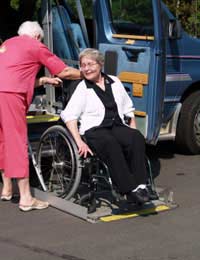Getting About in Bad Weather Once You've Retired

Having issues with mobility can present daily challenges but nothing makes it quite so difficult as dealing with adverse weather conditions. For those in retirement and who are already coping with mobility difficulties, this is something that many fear.
It can be isolating, cutting you off at home – as well as increasing your heating bills! Snow and ice make it harder to walk or use mobility vehicles, and sleet or heavy rain can make getting about really difficult too.
It’s important to make sure there is food in the cupboards in the cold weather too, and this can mean needing to be out and about to go shopping. The main thing is to do it safely
Shopping
The safest thing to do when there’s a particularly severe bout of adverse weather such as snow and ice, is to try not to go out or travel if possible. It’s easy to slip and fall, or have an accident if the roads are icy. But this isn’t always possible, and you may need to shop for food or visit the doctors or pharmacy for treatment or medication.If you need to go shopping, it might be worth checking with friends or neighbours by calling them on the phone, to see if they can either go with you, or perhaps even shop on your behalf. Many chemists have a delivery service for medication, so look into this too. If you are a proficient user of the internet, plan ahead when bad weather is on the horizon and perhaps order food for delivery.
Age Concern stress that it’s very important that in the cold weather at least one hot meal is eaten every day, so make sure you take care of yourself
Transport
Very often in bad weather, your best option is public transport. If you can make your way to a station or stop, the chances are that the roads will be more clear than if you are coming from smaller, residential side roads, which often don’t get gritted. Larger vehicles on well-used routes are definitely saferCommunication
It may be a good idea to have a mobile phone as this can be very helpful in bad weather. If you are stranded somewhere, you can ring from your car, for example. It’s something helpful to have all the time anyway, for those with mobility issues. But remember to take it out with you, fully charged!Getting Help
Your local authority will be able to give help and advice for those who have mobility issues and who are struggling with adverse weather conditions. They may well have a list of numbers for local volunteers – many of whom have four wheel drive vehicles – who can shop and help those who are having trouble getting out and about.Frostbite, Falls and Tumbles
Those who move more slowly in icy cold conditions are more prone to frostbite so make sure you are adequately dressed up for the warmth. And if you have a fall, remember the RICE procedure for both issues… Rest the injured part, Ice pad should be applied to the injured area, Comfortably support the injury and Elevate the injured area. If it’s serious call an ambulance, but if less urgent, NHS Direct can help too. Make sure you have your mobile phone with you!- Staying in Touch With Family and Managing Visits
- Quiz: Are You Safe to Continue Driving in Old Age?
- Taking Mobility Equipment On Public Transport
- Travelling Abroad With Mobility Problems
- Considerations When Driving in Retirement
- Having a Car Adapted to Suit Your Needs
- Parking and the Blue Badge Scheme
- Powered Scooters and Wheelchairs to Get You Mobile in Retirement
- Servicing, Taxing and Insurance Your Vehicle in Retirement
- Car Purchasing and the Motability Scheme


Re: Financing and Grants for Home Mobility Equipment
My partner is suffering from copd, sarcoidosis, bronchiectasis and pulmonary fibrosis.. She is finding…
Re: Financing and Grants for Home Mobility Equipment
Hi I have lost the use of my right hand which had operations for carpal tunnel trigger finger seemingly…
Re: Financing and Grants for Home Mobility Equipment
Hello my dad get a mobility car to help get around, He wounding do you think he could get a mobility…
Re: Financing and Grants for Home Mobility Equipment
My problem is both my Knees have failed there MOT,I spent 11days in Hospital as I couldn't Put any…
Re: Financing and Grants for Home Mobility Equipment
I was diagnosed with Fibromyalgia over 23 years ago. Nobody believed me, my children as well as doctors.…
Re: Financing and Grants for Home Mobility Equipment
I have been trying to get help for a bath put In I carnt get none anywere I cannot use the shower it…
Re: The Benefits of Keeping an Active Mind
sir ,my mind remmber well about some time not remmber any thing what process that wi;ll i do
Re: Financing and Grants Available for Transport In Retirement
My dad keeps losing balance on his legs done have much money he needs a mobility scooter…
Re: Financing and Grants Available for Transport In Retirement
I have just come out of hospital. I have astma and very difficult to walk .I can not go out…
Re: Financing and Grants for Home Mobility Equipment
Kaza - Your Question:I av arthritis in both knees and in my right hand and index finger. I need help to…